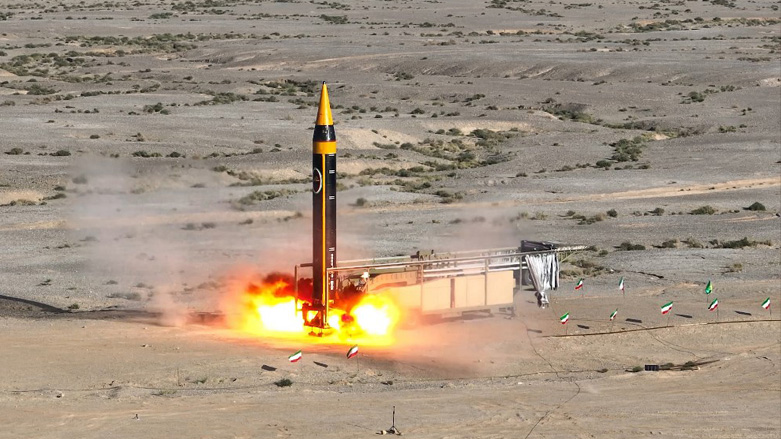U.S. announces new Iran sanctions amid reports of 'major progress' in nuclear deal

WASHINGTON DC, United States (Kurdistan 24) – A contradictory picture is emerging of the Biden administration’s policy toward Iran.
Earlier this week, the U.S. announced new sanctions related to the development of Iran’s ballistic missiles. The sanctions were imposed on individuals and entities from three countries: Iran, China, and Hong Kong.
Yet that same day Tehran made its own announcement: it had succeeded in producing a ballistic missile capable of flying at fifteen times the speed of sound, or so it claimed.
Those two announcements, on Tuesday, came against a backdrop of increasing tensions, caused by Tehran’s suppression of domestic unrest, triggered by the death last September of the young Kurdish woman, Zhina (Mahsa) Amini, while in police custody, as well as Iran’s support for Russia in its war with Ukraine.
As recently as May 15, John Kirby, Coordinator for Strategic Communications at the National Security Council, denounced Iran as Russia’s “top military backer.”
Read More: U.S. to continue action against Iranian arms transfers to Russia
Yet on Wednesday, the highly regarded Israeli newspaper, Ha’aretz, reported that “major progress” had been made in nuclear talks between the U.S. and Iran, and “Israel expects an agreement to be reached within a few weeks.”
Asked about that report later on Wednesday, State Department Deputy Spokesperson Vedant Patel declined to comment, beyond saying that the Biden administration remained “committed to never allowing Iran to acquire a nuclear weapon,” while we “believe that diplomacy is the best way to achieve that goal on a verifiable and durable basis.”
Israeli Report
“In an effort to reach an agreement on a nuclear deal,” Haaretz said, “contacts between the United States and Iran have made major progress in the past few days.”
“Israeli defense officials say the talks are moving forward more rapidly than expected,” it continued, and an agreement may be reached “within weeks.”
The new accord, Ha’aretz suggested, would involve Iran’s agreement to stop “enriching uranium to high levels,” while Washington would relax its sanctions to include “the release of some $20 billion in Iranian assets from frozen bank accounts outside of Iran”—in Iraq, as well as in South Korea and at the International Monetary Fund.
Behnam Ben Taleblu, a Senior Fellow at the Foundation for the Defense of Democracies, takes a dim view of any such agreement.
“The Biden administration does not seem to see the problems of how a limited bad deal can and will beget a worse one,” Ben Taleblu told Kurdistan 24. And “it doesn’t seem to understand that this money will finance the expansion of Iran’s hostage diplomacy, nuclear capacity, and terror apparatus.”
Iran’s New Missiles
Indeed, on Tuesday, Iran claimed to have indigenously produced a hypersonic missile, capable of flying at Mach 15, or fifteen times the speed of sound.
There was no way to confirm the claim, as Iran did not release video of a successful launch of the new missile. Rather, the head of the Islamic Revolutionary Guard Corps’ aerospace program, Gen. Amir Ali Hajizadeh, unveiled a model of the missile, which Iran has named Fattah, or Conqueror,
As he proclaimed, “There exists no system that can rival or counter this missile.”
Just two weeks before, Iran had announced that it had succeeded in manufacturing a new ballistic missile, with a range of 2,000 kilometers and capable of carrying a 1,500 kilogram (3,300 pound) warhead. On that occasion, Iran did release a video of the launch.
Read More: U.S. Condemns Iran’s New Long-Range Missile, as Middle East Tensions Build
U.N. Security Council Resolution 2231, which endorsed the original Iranian nuclear deal, was approved unanimously in July 2015. It included provisions limiting Iranian missile activity. Tehran would appear to be in violation of the missile restrictions in that resolution.
New U.S. Sanctions
On Tuesday, the U.S. Treasury Department announced sanctions on seven individuals and six entities—in Iran, China, and Hong Kong—related to Iran’s ballistic missile program. The new sanctions suggest how Iran is making advances in manufacturing its own missiles: it is receiving significant support from Chinese companies.
The majority of the sanctioned companies are Chinese. They “conducted financial transactions and facilitated procurement of sensitive and critical parts and technology” for Iran’s missile program, the Treasury Department said. That support includes centrifuges, which are used for “the production of nitrocellulose, an essential raw material for propellants and combustible components.”
The Chinese companies also provided “dual-use metals” to Iran, sometimes acting contrary to warnings from their own government not to deal with Iranian firms that have been sanctioned by Washington.
As Iran continues to make progress in its missile program, despite the many sanctions that Washington has imposed, a question arises as to how effective such measures really are that target individuals and companies—as opposed to those that limit a country’s income or block its financial transactions.
That question will become highly relevant, if, as Haaretz reported, a nuclear deal is reached that provides Iran a very significant amount of new funds.
